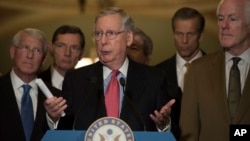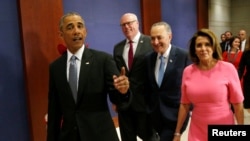The United States Senate has taken the first step toward ending President Barack Obama's healthcare program.
Cancelling the Affordable Care Act, also known as Obamacare, is one of the top goals of the Republican Party and President-elect Donald Trump.
Early Thursday, the Senate voted 51-48 to approve rules that permit a repeal of the act to go forward with only a simple majority vote.
The Republicans control 52 of the Senate’s 100 seats. The Democratic Party controls 46 seats, with two independents holding two others.
Under the rules, Senate Democrats are no longer able to block or delay future votes on Obamacare by making a long speech or series of speeches. This technique, called a filibuster, has often been used over the years in American politics.
Reactions
Mitch McConnell of Kentucky is the Senate Majority Leader. He praised the passage of the measure Thursday. He said it would help "repeal this failed law [Obamacare] while we move ahead with smarter healthcare policies."
Georgia Senator David Purdue, another Republican, said Obamacare is "collapsing" and that his party has ideas to make it better.
Senate Democrats criticized the vote, noting the lack of a clear replacement for the healthcare program.
"It's official, Senate Republicans have taken the first step to take away your healthcare without a replacement. Shameful," wrote Senator Bob Menendez of New Jersey.
What replaces Obamacare?
Republican leaders plan to have the actual measure for canceling the legislation ready by the end of January.
The big question is this: what would happen if the Republicans are successful in repealing the Affordable Care Act?
Congressional Republicans have yet to present a consensus plan on how to replace the law. Obamacare has brought insurance to some 20 million Americans who formerly had no health care plan.
President-elect Trump said Wednesday that he wants both the repeal and replace efforts to take place at the same time.
In 2010, Democratic lawmakers passed the Affordable Care Act (ACA) when they controlled both houses of Congress. The Democrats argue the law has helped slow the growth in healthcare spending and brought health care coverage to the poor. They also say it protects those with health problems who had been denied insurance under the old system.
Republicans have opposed the ACA since its passage. They argue that it costs too much and that individual states should have more control over healthcare spending.
In his speech on Tuesday, Obama said that he would publicly support any plan that covers the same number of people at a lower cost.
I’m Anne Ball.
Chris Hannas wrote this story for VOANews.com. John Russell adapted his report for Learning English. George Grow was the editor.
We want to hear from you. Write to us in the Comments Section.
______________________________________________________________
Words in This Story
priorities – n. plural the things that someone cares about and thinks are important
filibuster – v. an effort to prevent action in a legislature (such as the U.S. Senate or House of Representatives) by making a long speech or series of speeches
consensus – n. a general agreement about something; an idea or opinion that is shared by all the people in a group
coverage – n. the financial protection that is provided by an insurance policy
insurance – n. the business of protecting people or property; a way of guaranteeing protection of safety






